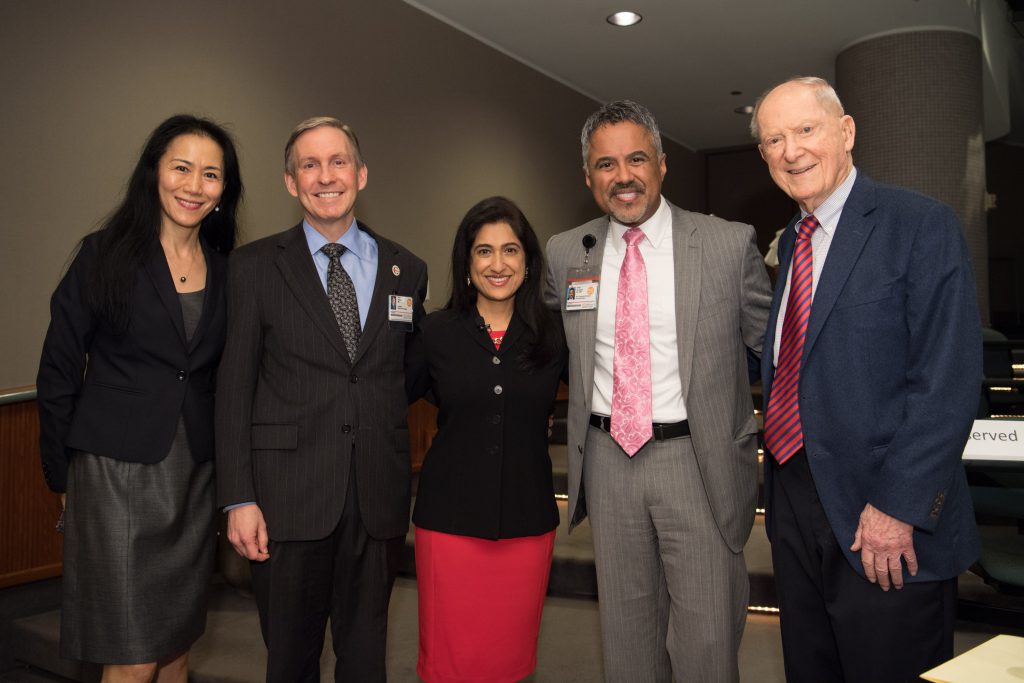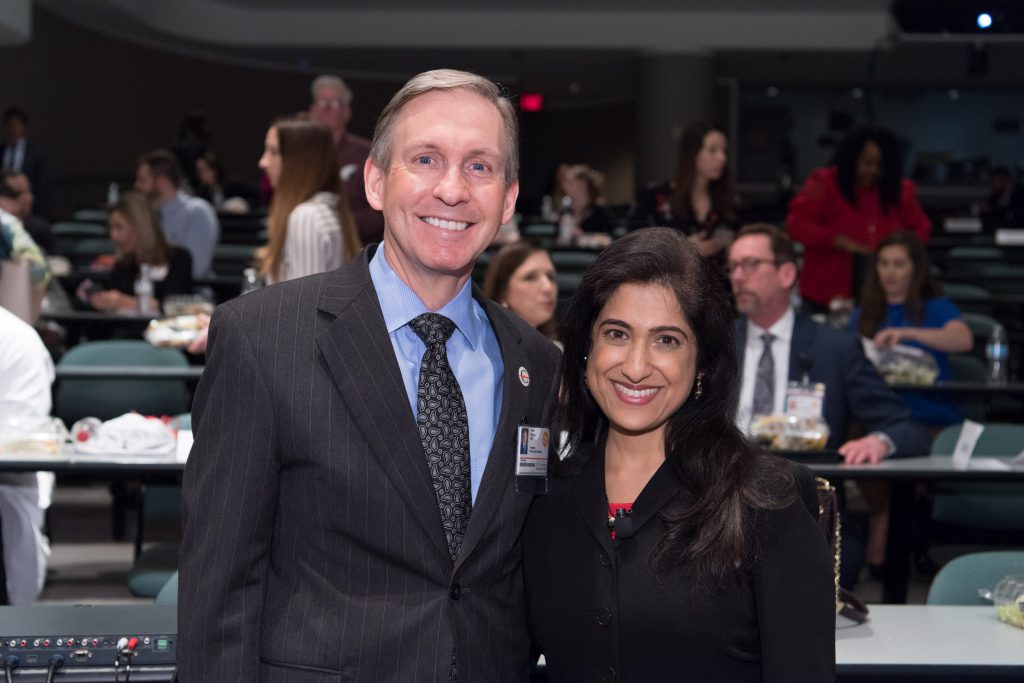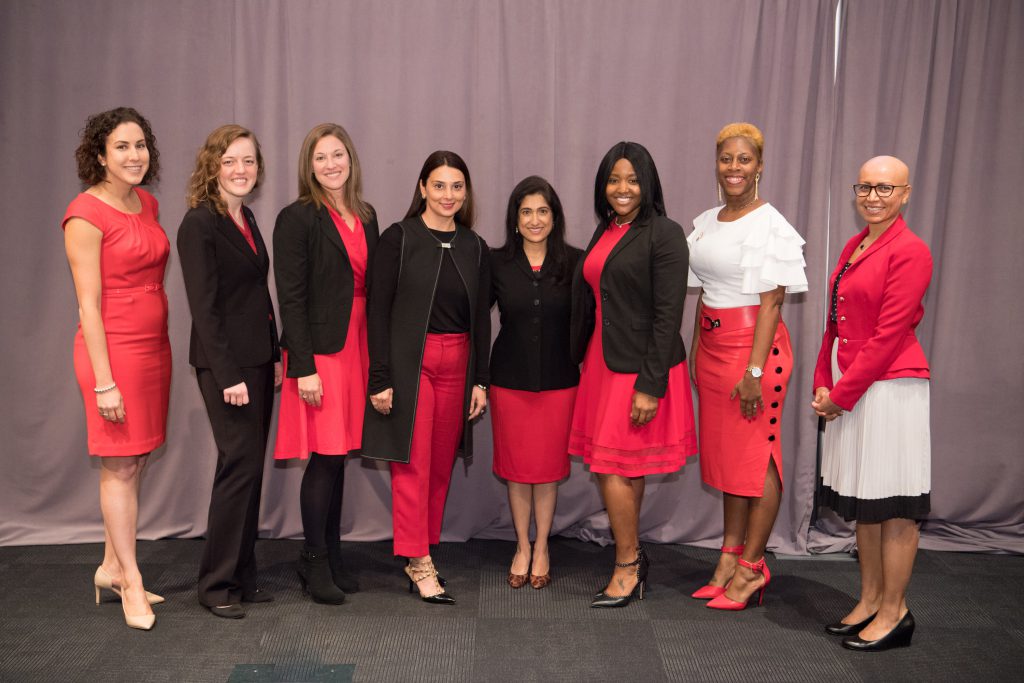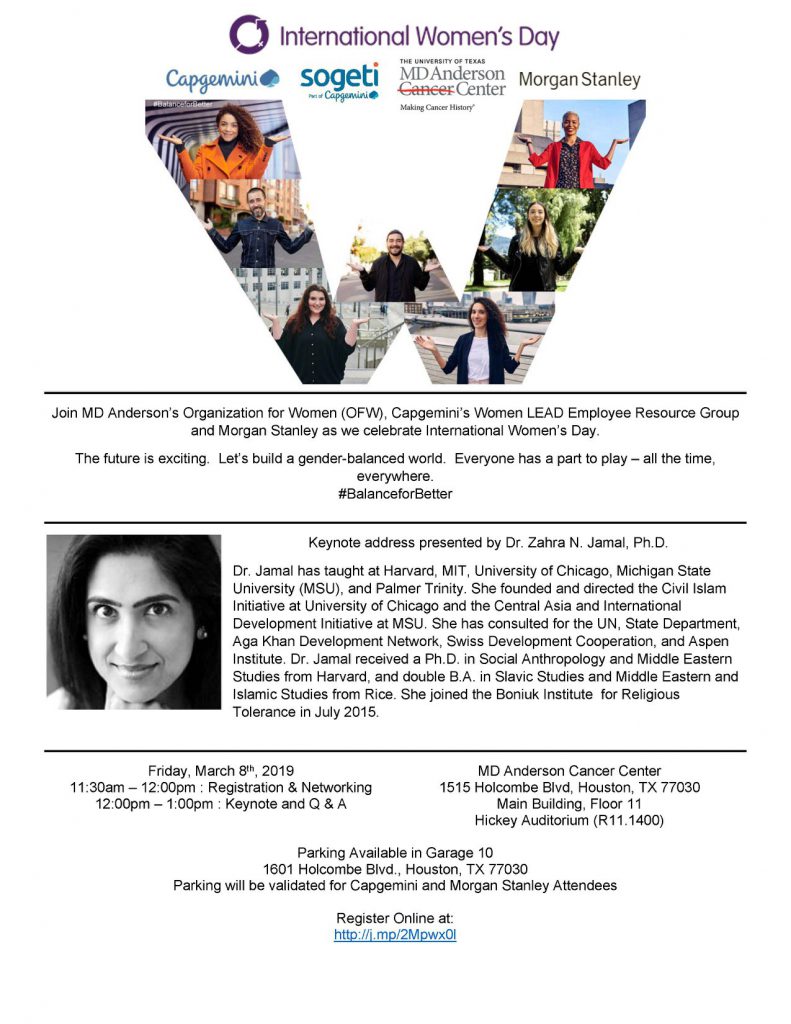Increasing Diversity, Equity, Inclusion in Healthcare Workforce, Cancer Research, and Patient Care

Following her keynote, Dr. Jamal (middle) is congratulated by the First Lady of Rice University Y. Ping Sun, MD Anderson President Dr. Peter Pisters, MD Anderson Chief Diversity Officer Shibu Varghese, and Rice Board of Trustees Former President Bill Barnett. (Photo: MD Anderson)
Design and deliver original, evidence-based programs to help MD Anderson Cancer Center, the #1 cancer hospital in the US and in the world, carry out its commitments to employ, understand, and serve diverse communities.
Challenge
Design and deliver three programs for healthcare executives, clinicians, staff, and researchers to address distinct needs: 1) increasing gender parity at all levels of the organization; 2) mitigating cancer disparities among diverse populations in research, education, prevention, and patient care; and 3) combating racism in healthcare access and services to be truly inclusive.
Outcomes
Keynote addresses, strategy development, workshops, and virtual events provided tailored knowledge, best practices for equity, and strategies for addressing women’s leadership, racism in healthcare, and racial health disparities. Content addressed MD Anderson leadership, Diversity Council, researchers, and the Cancer Center’s 22,000 employees who collectively served 1.4 million patients in 2020.
Why & How Women Can be Half of Leadership in a Decade (Keynote)
While half of humanity is largely absent from top leadership positions, under the leadership of President Dr. Peter Pister, MD Anderson Cancer Center successfully increased the percentage of women in upper management roles to 60%. Nyma Shah, a member of President Pister’s Advisory Council, approached Dr. Jamal to give a keynote address on International Women’s Day, after hearing her speak at the National Diversity Council. They wanted women to comprise 50% of teams at every level of the organization to achieve true gender parity, and Dr. Jamal was the right person to deliver the message to MD Anderson’s President, C suite, upper management, staff, Women’s Affinity Group, and area partners.
According to Harvard Business Review, women far outperform men in all leadership competencies but one. Yet only 4% of women sit in the c-suite of companies across the US. . Dr. Jamal delivered her findings on how women leaders drive success, explaining the disparity between the data and the reality, the value of engaging men in the push for parity, diverse women’s voices and experiences of discrimination, and best practices for reaching gender equality in leadership in the next 10 years. First lady of Rice University, members of Rice board of trustees, other Houston-area leaders joined 300 live attendees and a live-stream to over 21,000 MD Anderson employees.
Racial and Cultural Dimensions of Cancer Disparities (Keynote, Workshop, Strategy)
With the groundswell of energy resonating at MD Anderson for days after Dr. Jamal’s keynote on women’s leadership, Associate Vice President Dr. Larry Perkins and Imelda Wicks of the Office of Institutional Diversity called on Jamal again. They tapped her to keynote and run workshops at the Summer 2019 Diversity Council Retreat. Collectively, they agreed that Dr. Jamal would deliver a talk on cancer disparities across and within diverse groups, and how one-size-fits-all cancer guidelines do not work for people of color and vulnerable populations.
The larger goal was to co-create a strategy that would leverage data- and people-driven cultural insights to address health and cancer disparities. The strategy had to align with the Cancer Center’s mission and strategic plan on creating breakthrough research and expanding access to diverse populations locally, nationally, and globally. So, Dr. Jamal worked with the Office of Institutional Inclusion and the Health Disparities Research Department to jointly clarify research goals, identify researchers’ limitations in accessing underserved populations, and propose how the Diversity Council could help bridge the gap in order to develop the retreat workshops.
Leveraging cultural insights garnered from the Diversity Council Retreat, Dr. Jamal and MD Anderson worked to improve cancer outcomes of vulnerable populations by:
- Explaining the Diversity Council’s role as cultural brokers and knowledge sharers on cancer disparities among and within diverse groups.
- Connecting researchers and the multiple affinity groups represented in the Diversity Council to discuss culturally savvy ways to overcome challenges in access, data collection, trust, and healthcare engagement.
- Providing a roadmap for the Diversity Council and affinity groups to continue supporting researchers to better access, understand, and partner with underserved populations facing cancer disparities.
- Considering partnerships with cancer centers globally whose research reflects Houston’s demographic diversity to leverage culturally-salient insights in education, prevention, and care.
Coronavirus and Racism in Healthcare (Virtual Panel)
By Fall 2020, the pandemic and protests for racial justice were raging. Invited by the Office of Institutional Diversity, Dr. Jamal served as a panelist on a virtual “Fostering Inclusive Care While Combating Racism” event at MD Anderson’s Annual Diversity Celebration, which brings together its (now) 22,000 employees.
She discussed how COVID-19 not only impacted racial minorities more frequently and severely, but also how it worsened and laid bare systemic racism that causes disease and that limits healthcare access and service provision. She offered insights and possible solutions to combat racism in healthcare and beyond by addressing the root causes of unfair and discriminatory policies and practices, unconscious biases, and the historic injustices that underpin them.
Dr. Jamal’s remarks also touched on other sectors and industries: The racism that is at the root of racial health inequities is linked to discrimination in education, housing, food security, employment, the judicial system, infrastructure and environmental issues, and intergenerational poverty. Only now do growing members of the public and corporate employers see the ripple effects of these historic inequities and seek to address them sustainably.
By Peter Pisters
A balanced world is a better world, and I'm inspired, motivated and driven to #Balanceforbetter after @znjamal's powerful presentation @MDAndersonNews' #InternationalWomensDay event. I’m proud of the groundwork we’ve laid, but there's more to do, and each of us plays a key role. pic.twitter.com/axSKHCmyzd
— Peter WT Pisters, MD (@ppisters) March 8, 2019
Project Details
- Client: MD Anderson Cancer Center
- Reach: 22, 000 employees serving 1.4 million patients annually
- Customized Deliverables: Strategy Development, 2 Keynotes, Workshop, Panel Discussion
- Project Value (combined): $300,000
- Categories: Healthcare, Women, Race
A balanced world is a better world, and I'm inspired, motivated and driven to #Balanceforbetter after @znjamal's powerful presentation @MDAndersonNews' #InternationalWomensDay event. I’m proud of the groundwork we’ve laid, but there's more to do, and each of us plays a key role. pic.twitter.com/axSKHCmyzd
— Peter WT Pisters, MD (@ppisters) March 8, 2019
The support of women @MDAndersonNews is very important to me. Looking forward to attending MD Anderson's #InternationalWomensDay seminar today and learning from @znjamal as we work to #BalanceforBetter both within our organization and beyond. #endcancer pic.twitter.com/EXTy8zhHbk
— Peter WT Pisters, MD (@ppisters) March 8, 2019
What an inspiring talk by @znjamal at @MDAndersonNews for International Women’s Day! Thanks @ppisters & @svargheseCHRO for being our male champions. Thanks to @Britchand & @ShahNyma for your leadership. My notes here for those who missed it! pic.twitter.com/wRVZKErh3b
— Shamsha Damani (@shamsha) March 8, 2019
Fantastic presentation Dr. Jamal @znjamal! I am inspired and dedicated to the institution’s effort to continually cultivate a diverse and inclusive workplace. Kudos @MDAndersonNews for ensuring our leadership team reflect the diversity of our patient and employee population.
— Shanika R. Serial (@ShanikaSerial) March 8, 2019
I enjoyed visiting my friends at @MDAndersonNews to commemorate #InternationalWomansDay2019 . Great leadership @Britchand and @ShahNyma ! @znjamal delivered a fantastic (and sobering) keynote! https://t.co/vBPM8yxEYN
— Allison Odom (@AOBGeez) March 8, 2019
Celebrating our diverse & inclusive workplace at the virtual 2020 @MDAndersonNews Diversity Celebration! A thought-provoking discussion today on Fostering Inclusive #Healthcare w @UHouston Spann, Rice's @znjamal & @hserag. "Inclusion Makes Us Stronger!" #OneMDAnderson #endcancer pic.twitter.com/C2T20YntNp
— Ishwaria Subbiah, MD MS (@IshwariaMD) August 18, 2020






